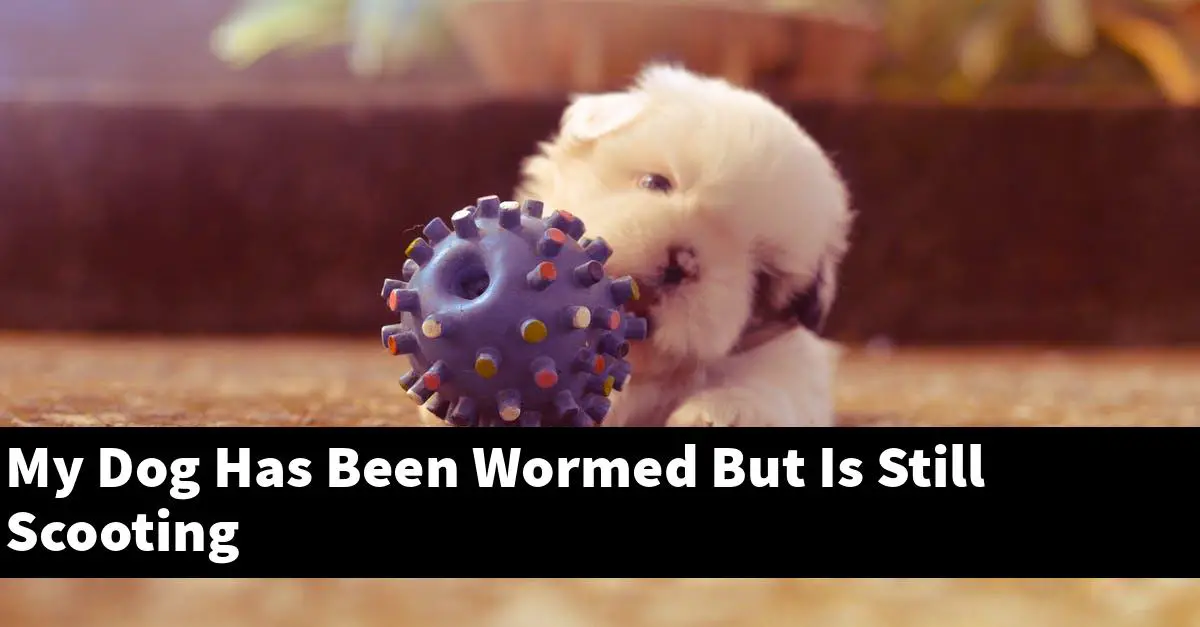Scooting, or dragging the bottom along the ground, can be a sign that your dog has worms. If your dog has been wormed but is still scooting, it may be a sign that the worming medication was not effective or that your dog has a different type of worm.
The article is going to be covering different reasons why your dog may still be scooting even after being wormed.
Table of Contents
What could be the reason my dog has been wormed but is still scooting?
There are a few potential reasons why your dog may have been wormed but is still scooting. One possibility is that your dog has tapeworms. Tapeworms are a type of parasitic worm that lives in the intestines of animals. They are passed on to animals when they eat infected fleas or other animals. Symptoms of tapeworms include weight loss, diarrhea, and scooting. Another possibility is that your dog has an anal gland infection. Anal gland infections are common in dogs and can cause symptoms like scooting, licking, and chewing. The anal glands are two small glands located near the anus. They produce a foul-smelling liquid that helps keep the anus clean. If these glands become infected, they can leak pus and cause irritation.
Is there anything else I can do to help my dog besides worming them?
There are many things that you can do to help your dog in addition to worming them. Some other things that you can do include:
– Providing them with plenty of exercise
– Ensuring that they have a balanced diet
– Keeping their living area clean and free of debris
– Keeping them up to date on vaccinations
Each of these things play an important role in keeping your dog healthy and happy. Exercise helps to keep their muscles and joints strong, while a balanced diet helps to provide them with the nutrients they need to stay healthy. Keeping their living area clean helps to prevent the spread of disease, and vaccinations help to protect them from potentially deadly illnesses.
By taking care of your dog and giving them the best possible life, you can help them to live a long and healthy life.
How often should I worm my dog?
How often should I worm my dog?
The frequency with which you should worm your dog depends on a few factors, including their age, health, and lifestyle.
Puppies should be wormed every two weeks until they are 12 weeks old. After that, they should be wormed every month until they are six months old. After that, they should be wormed every three months for the rest of their lives.
Dogs that go outside a lot or that are around other animals are at a higher risk of getting worms, so they may need to be wormed more often. Dogs that are sick or have a weakened immune system may also need to be wormed more often.
Talk to your veterinarian about how often you should worm your dog. They can help you develop a worming schedule that is right for your dog.
What are the side effects of worming my dog?
There are many different types of worming medication available for dogs, and the side effects will vary depending on the type of drug used. The most common side effects are vomiting and diarrhea, which can usually be treated by withholding food for 12 hours and then reintroducing it slowly. Some worming medications can also cause liver damage, so it is important to talk to your veterinarian before starting any worming treatment.
Why is my dog scooting after being wormed?
There are a few different reasons why your dog may be scooting after being wormed. The most common reason is that the worms are causing irritation to your dog’s anus or rectum. This can be uncomfortable and may cause your dog to want to relieve the irritation by scooting.
Another possibility is that your dog has an allergic reaction to the worming medication. This is relatively rare, but it can happen. If your dog is showing other signs of an allergic reaction, such as excessive scratching, vomiting, or diarrhea, then you should take them to the vet.
Finally, it’s possible that your dog is just feeling a bit uncomfortable after the worming process. This is usually not cause for concern and will pass within a day or two. If your dog is still scooting after a few days, or if they seem to be in pain, then you should take them to the vet.
When should I take my dog to the vet for scooting?
When your dog scoots, it’s a sign that something is wrong. It could be anything from an anal gland issue to a more serious problem like a rectal tumor. If your dog is scooting, it’s important to take him to the vet to find out what’s causing the problem.
If your dog is scooting on his bottom, it’s likely that he has an anal gland issue. Anal glands are located on either side of the anus, and they can become infected or full. When this happens, your dog may scoot to try to relieve the pressure. Your vet can express the glands and give your dog relief.
If your dog is scooting and you don’t think it’s an anal gland issue, it’s important to take him to the vet to rule out other potential problems. He may have a rectal tumor or another health problem that is causing him discomfort. Only your vet can determine what is causing your dog’s scooting and give you the best course of treatment.
What to do if your dog keep scooting her but across the floor?
If your dog is scooting her butt across the floor, it could be a sign that she is trying to relieve an itch or irritation. The most common cause of this is anal gland problems. Other possible causes include allergies, infection, or constipation.
If your dog is scooting her butt across the floor, the first thing you should do is take her to the vet. They will be able to determine the underlying cause and recommend the best course of treatment. Anal gland problems can usually be resolved with a simple expression or surgery, but other causes may require more intensive treatment.
What is the most common reason for scooting in dogs?
There are a few reasons that your dog may scoot their bottom along the ground. The most common reason is that they are trying to relieve an itch. Your dog may have allergies or parasites that are causing the itch. Another common reason for scooting is that your dog has impacted anal glands. These glands need to be expressed periodically to avoid discomfort. If your dog is scooting frequently, it is best to take them to the vet to rule out any medical conditions.
Summary
:
There are a few potential reasons why your dog may have been wormed but is still scooting. One possibility is that your dog has tapeworms. Another possibility is that your dog has an anal gland infection. The anal glands are two small glands located near the anus. If these glands become infected, they can leak pus and cause irritation.


